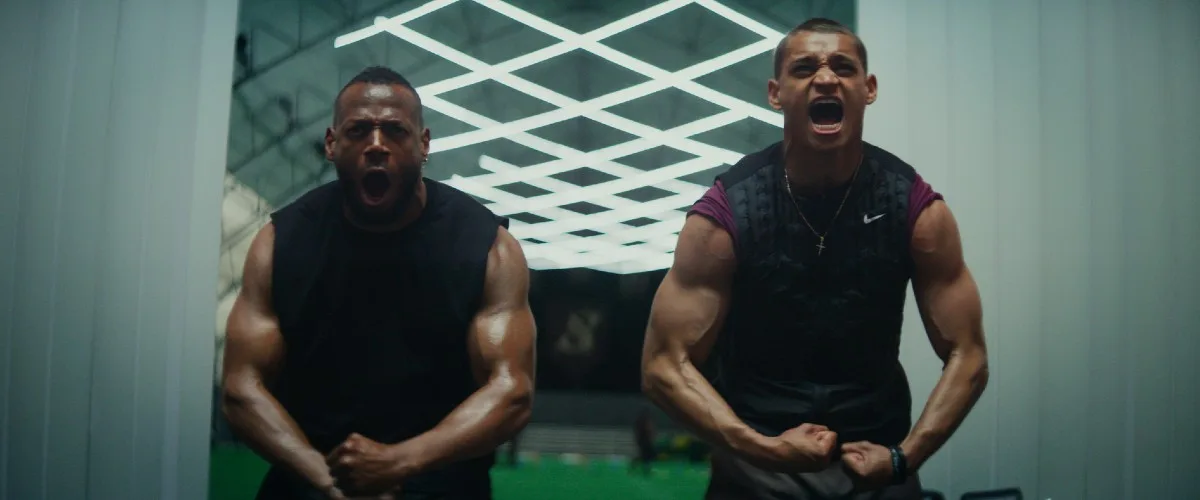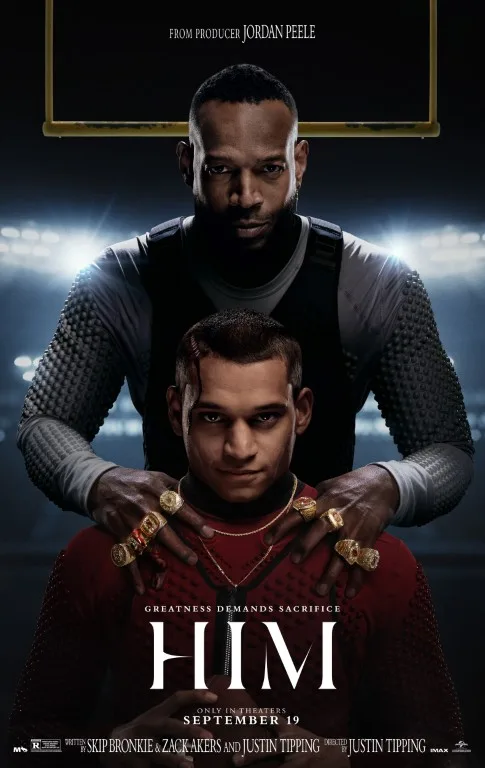I can’t believe I left the house to see “HIM.” I can’t believe I took the train for over an hour from the north side of Chicago to downtown to see this movie. I can’t believe I stood in line to buy a soda and popcorn at the theater to see “HIM.” And I especially can’t believe that I sat through the entirety of this thematically lost movie, allowed it to live in my head on my trip back home, and that I’m currently sitting on my couch writing about it. Putrid and hollow, Justin Tipping’s brain-dead football horror film, which somehow managed to secure the backing of producer Jordan Peele, is incomprehensibly bad.
I won’t belabor my hate of “HIM” because the movie hasn’t earned it. Instead, here’s the quick skinny: Ever since Cameron “Cam” Cade was a child watching Saviours quarterback Isaiah White (Marlon Wayans) play football, he’s dreamed of fulfilling his boisterous father’s wish that he become the GOAT. “That’s what real men do. They make sacrifices,” Cam’s dad tells him as they watch Isaiah on TV, dealing with a career-threatening injury. “No guts. No glory.” Fast forward fourteen years, and Cam (a stiff Tyriq Withers) is the newest generational talent at QB to enter the draft. His promising career is jeopardized, however, when a demonic spirit cracks his head hard enough to cause a perilous brain injury. Thankfully for Cam, Isaiah, who’s now an eight-time champion, is thinking of retiring and wants Cam to train with him for a week to see if the young stud has what it takes.
Why does Cam feel like training with Isaiah is his only path to the league? How is it that a title-winning team like the Saviours holds a high enough draft position to nab Cam? None of that is explained. Instead, the film skips over details and takes shortcuts to position some half-baked horror. Consider that when Cam arrives at Isaiah’s remote desert compound, which is surrounded by white-coated sycophants out of “Mad Max: Fury Road,” he’s expected to turn in his phone. This might be the fourth movie I’ve seen in the last calendar year that’s conveniently used a scene like that to subtract technology from the narrative.
Moments like that are among the many red flags warning of a film that doesn’t seem to know what it’s saying or the best path to convey its muddled message. Instead, Tipping’s follow-up to “Kicks” is a total structural failure whose blame lies at the feet of a dreadfully confused and inert script penned by Tipping, Skip Bronkie, and Zack Akers.
Split into six chapters, which correspond to each day of the week, we watch perplexingly as Tipping attempts to make broad statements about football. For instance, Cam is quickly freaked out by Isaiah’s irregular training methods, which are meant to push the young quarterback to greatness. But the source of Isaiah’s dogged and dangerous techniques is left undetermined. Is it the love of the sport, the reach for glory, or the desire to prove his superiority in what he calls a gladiator sport that compels Isaiah? The longer the film goes, the more it appears to be a critique of the White ownership that breaks down and throws away Black bodies, but even those nonsensical narrative choices destabilize the thesis.
“HIM” wants to deliver psychic shocks, but the film doesn’t know what approach to take. The demonic scenes that seem to be inside Cam’s head—a glittering mascot wielding a sledgehammer often lurks in the shadows—oscillate between being internalized and externalized with no real logic backing up the switches. We see medicines injected by Isaiah’s personal trainer that are meant to increase Cam’s performance, but the body horror of watching the needle pierce Cam’s skin falls flat because we don’t know what’s in the vials or their actual effect. The film, for good measure, even tries to insert a Jesus motif whose religious importance is ham-fisted, rushed, and not all that original.
These ideas were handled far more gracefully in Oliver Stone’s “Any Given Sunday,” which understood how to critique a system while worshipping its results. “HIM” doesn’t come nearly as close to such dexterity. The dialogue is dreadful; the performances are wooden, particularly Julia Fox as Isaiah’s wife; and a 53-year-old Wayans is far too old for the part. There isn’t a single moment of this film that borders on belief as it winds toward a cheap, bloody final freakout that is tepidly filmed in a way that makes you wonder if Tipping believes the horror he’s selling.
DP Kira Kelly fashions some arresting compositions, such as bending around the winding tunnels of Isaiah’s serpentine compound or infrared x-rays depicting the punishing collision of bodies. But what good are pretty images if they’re in service of nothing?




















